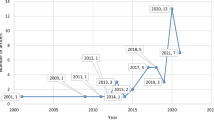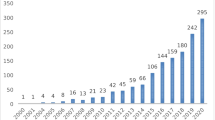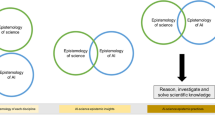Abstract
The study investigates in the Benchmark for Scientific Literacy of Chinese Citizens. The background of issuing the Benchmark, its procedure, and contents are analyzed; the key for analysis revolves around the huge debate triggered by the Benchmark on Chinese internet. The debate can be traced to historical discussions in China, regarding the relation between science and humanity, the boundary of science, and the goals for science education. We recognize that in the anxiety for modernization since 1840s in China, the gap between science and humanity studies persists; scientism still dominates the dialogue. Instead, we value pluralism in science and scientific literacy, and emphasize locality as a framework in understanding and assessing traditional Chinese knowledge and practices, including yin-yang theory, the five phases theory, and feng shui. We propose that good science education aims at eliminating scientism, enriching public understandings on the history of science, the culture, and philosophy of science.
Similar content being viewed by others
References
Anonymous. (2020) Why is geomancy a science? https://zhuanlan.zhihu.com/p/265897363. Accessed 29 June 2020
Chen, Maike. (2016) How to evaluate the notice of the Ministry of Science and Technology on the issuance of “The Benchmark of Civic Scientific Literacy in China”? https://www.zhihu.com/question/43717135. Accessed 21 Dec 2020
Chen, Ning. (2016) It’s not suitable for Yin and Yang and five phases to be adopt in the Benchmark of Civic Scientific Literacy in China yet. http://blog.sciencenet.cn/blog-207851-972738.html. Accessed 13 July 2020
Chen, Xuelei. Feng, Longlong. Kang, Xi. Liu, Jifeng. Pan, Jun. Shen, Juntai. Zhang, Pengjie. Zhang, Shuangnan. (2016) Suggestions on some problems in the Benchmark of Civic Scientific Literacy in China. http://news.sciencenet.cn/news/sub26.aspx?id=2590. Accessed 25 June 2016
Dong, Jielin. (2016) Yin and yang and five phases are antagonistic ideas against scientific literacy. http://blog.sciencenet.cn/blog-1188744-973347.html. Accessed 28 Apr 2016
Fan, D. (2005). The history and critique on Scientism in China. Science & Culture Review, 6, 27–40.
Fang, Zhouzi. (2005) Fear of nature is anti-science, Beijing News. 2005–01–13.
Feng Y L. Why there is no science in China. International Journal of Ethics, 1922, XXXII(3).
Fu, Lei (2016). History of and thought on the Benchmark of Civic Scientific Literacy in China. http://blog.sciencenet.cn/home.php?mod=space&uid=797254&do=blog&id=972347. Accessed 30 June 2020
Gao, H., & Ju, S. (2016). The establishment of the Benchmark of Civic Scientific Literacy in China: International initiatives and domestic exploration. Chinese Science Bulletin, 61(17), 1847–1856.
Geertz, Clifford.(1983) Local knowledge: Further essays in interpretive anthropology, Basic Books, pp.167–234.
Gong, Ming. (2016). Be a conveyor of knowledge, not an egghead. http://blog.sciencenet.cn/blog-709494-973567.html. Accessed 13 July 2020
Harding, Sandra.(1998) Is science multi-cultural? Postcolonialisms, feminims, and epistemologies, Bloomington, IN: Indiana University Press: pp.9–15, pp.165–187.
He, Zuoxiu. (2005). Man needs not fear nature Global, 1, 30–31.
Kwok, D.W.Y. (1965) Scientism in Chinese Thought: 1900–1950, Yale University Press, P.11, P.21.
Li, D. (2006). The conceptualization of scientific literacy and the Chinese understanding of it. Science, 58(3), 25–28.
Liu, B. (2000). Some ideas about whether there was science in Imperial China. Impact of Science on Society, 4, 55.
Liu, B. (2016). Why do we discuss what science is –- Comments on What is Science. Science, 68(6), 1–4.
Liu, D. (2000). Some views on the debate of whether there is science in ancient China. Impact of Science on Society, 4, 63–64.
Ma, L. (2008). On basic notions in the Benchmark of Civic Scientific Literacy in China. Guizhou Social Sciences, 8, 4–10.
Ma, Laiping (2016), Two core questions about the Benchmark of Civic Scientific Literacy in China, Conference paper on the 23rd Meeting of the Research on Science Popularization, pp.266–273.
Matthews, Michael. R. (2019) Feng shui: Teaching about science and pseudoscience, Springer.
Ma, Tingguang. (2016). On the background of the birth of yin and yang and five phases theories. http://blog.sciencenet.cn/blog-302992-973391.html. Accessed 15 July 2020
Ma, Xiaodong (2007). Follow up with progress of the Project 2049. http://www.sgst.cn/xwdt/shsd/200705/t20070518_128981.html. Accessed 15 July 2020
McComas, W. F., & Almazroa, H. (1998). The nature of science in science education: An introduction. Science & Education, 7, 511–532.
Meng, Jin. (2016). Between the Benchmark and the Outline. http://blog.sciencenet.cn/blog-4699-975280.html. Accessed 1 Aug 2020
Miller, Jon D. (1979), Prewitt K. The Measurement of the attitudes of the U.S. public toward organized science. Report to the National Science Foundation under Contract SRS78–16839[R].Chicago: 4 National Opinion Research Center, University of Chicago.
Miller, J. D. (1983). Scientific literacy: A conceptual and empirical review. Daedalus, 112, 29–48.
Miller, J. D. (1998). The measurement of civic scientific literacy. Public Understanding of Science, 7, 203–223.
Ministry of Science and Technology, PRC (2015). Announcement of the General Office of the Ministry of Science and Technology on soliciting public opinions on the Benchmark of Civic Scientific Literacy in China. http://appweblogic.most.gov.cn/wsdc/zggmkxszjz/index.htm. Accessed 9 Dec 2020
Ministry of Science and Technology, PRC (2016). Circular of the Ministry of Science and Technology and the Propaganda Department of the CPC Central Committee on Printing and Distributing the Benchmark of Civic Scientific Literacy in China. http://www.most.gov.cn/fggw/zfwj/zfwj2016/201607/t20160701_126220.htm. Accessed 10 Dec 2020
Ren, H. (1915). On the absence of science in China. Science, 1(1), 8–13.
Rouse, J. (1987). Knowledge and power, toward a political philosophy of science (p. 119). Cornell University Press.
SELF. (2017). Online video, should yin and yang and five phases be included in the Benchmark of Civic Scientific Literacy in China? https://v.qq.com/x/page/m0386td9ss0.html. Accessed 15 Dec 2020
Shi, Xiaolei. (2016). Two misconceptions about public scientific literacy. http://blog.sciencenet.cn/blog-451927-973820.html. Accessed 25 Nov 2020
Shi, Yu. (2016). One possible reason for the series of errors in the Benchmark of Civic Scientific Literacy in China. http://blog.sciencenet.cn/blog-4395-972514.html. Accessed 16 Nov 2020
Sun, Xiaochun. (2016) On “Yin and Yang and five phases” written into the Benchmark of Civic Scientific Literacy in China, Science and Technology Daily, 2016–04–29(006).
Tang, Lin (2017) The Benchmark triggers huge social debates, Science News, no.2, 42–43.
Wang, Jiawen. (2016) What is the problem with the Benchmark of Civic Scientific Literacy in China? Chinese Science News, 2016–04–26(001).
Wang, W. (2016). Fierce debates surrounding the Benchmark. Science and Technology Review, 34(9), 9.
Wen, Xinhong. Li, Yun. (2016) What kind of scientific literacy benchmarks do Chinese citizens need? Chinese Science News,2016–04–29.
Wu, G. (2015). Whether there is science in ancient China. Science, 67(3), 3–8.
Wu, T. (2012). The education of history of science: An inspirational education of heroic epic? Journal of Hechi University, 32(04), 8–11.
Xu, Jiaju, Li, Qun, Xiao, Jian, Xutong, Wang, & Leming, Tang. (2013). Empirical study on evaluation sampling and the indicator system of the Benchmark for Scientific Literacy of Chinese Citizens. Mathematics in Practice and Theory, 43(11), 139–145.
Zhang, Meifang. Liu, Bing. (2006) Post-colonialism, feminism and the study of the history of science in China: Theoretical possibility in the sense of scientific historiography, Journal of Dialectics of Nature (02):65–70+111.
Zhu, K. (1946). Why didn’t natural science emerge in ancient China. Science, 28(3), 137–141.
Zhu, Xiaomin. (2007) Reflections on the history of science popularization in China since the establishment of the PRC, Liu, Huajie ed., Readings in the Science Communication, Shanghai Jiao Tong University Press, 2007:45–58.
Author information
Authors and Affiliations
Corresponding author
Ethics declarations
Conflict of Interest
The authors declare that they have no conflict of interest.
Additional information
Publisher's Note
Springer Nature remains neutral with regard to jurisdictional claims in published maps and institutional affiliations.
Rights and permissions
About this article
Cite this article
Zhang, M., Liu, B. The Theoretical Foundations of Feng Shui and Science Education in China. Sci & Educ 30, 1473–1490 (2021). https://doi.org/10.1007/s11191-021-00241-y
Accepted:
Published:
Issue Date:
DOI: https://doi.org/10.1007/s11191-021-00241-y




